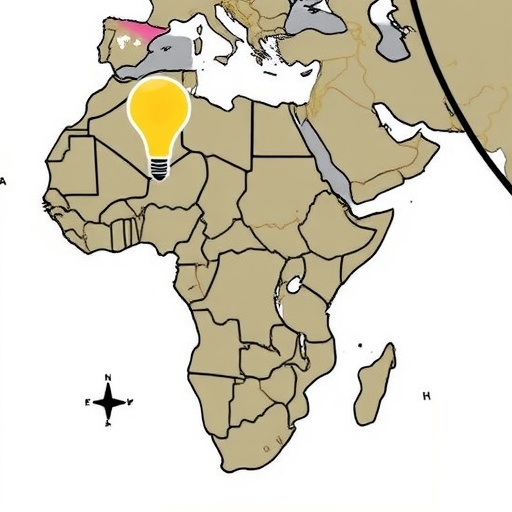In the face of escalating climate crises and an unfolding energy transition, Africa stands at a critical crossroads, possessing an abundant wealth of renewable energy resources. A recent groundbreaking study by Chiteka and Enweremadu proposes an innovative integrated framework designed to harness this potential effectively, aiming for both energy justice and climate resilience. The research illuminates the path forward, calling for a dynamic considerate approach to energy that can serve as a blueprint for sustainable development across the continent.
The essence of this research lies in recognizing that Africa is endowed with a diverse array of renewable energy sources, including solar, wind, hydro, and biomass. The study highlights that these resources are not merely sources of energy but also hold the key to addressing socio-economic disparities in energy access. By establishing an integrated framework, the study proposes a path that seeks to ensure that the benefits of renewable energy reach the most marginalized populations. This dual focus on equity and sustainability places the framework in a prime position to address the various socio-economic challenges that many African nations face.
Solar energy, in particular, emerges as a frontrunner in Africa’s renewable energy landscape. With vast sun-drenched regions, solar power can provide clean energy to millions who currently lack access to electricity. The study advocates for the deployment of decentralized solar systems, which can be installed rapidly and tailored to meet local needs. Such systems have the potential not only to power homes and businesses but also to stimulate local economies through job creation in the installation and maintenance sectors.
Wind energy, while less ubiquitous than solar, also presents significant opportunities, particularly in coastal and high-altitude regions of Africa. The authors draw attention to successful models in countries like South Africa and Kenya, where wind farms have significantly contributed to national grids. Furthermore, the study emphasizes the importance of scaling up investment in wind technology to diversify the continent’s energy portfolio and mitigate reliance on fossil fuels.
Hydropower remains a mainstay in Africa’s energy mix, yet the research underscores the need for careful consideration of environmental and social impacts. Large hydropower projects often displace communities and disrupt ecosystems. Therefore, the authors suggest a shift toward small-scale, run-of-the-river hydropower projects, which have a lower ecological footprint and can still provide reliable energy. This approach aligns with the overarching goal of energy justice, ensuring that energy projects do not come at the expense of vulnerable populations.
Biomass energy is crucial in many rural communities across Africa, particularly for cooking and heating. However, the study warns against unsustainable harvesting practices that can lead to deforestation and degradation of land. It calls for the promotion of efficient biomass technologies and sustainable management practices that balance energy needs with environmental stewardship. By integrating these considerations into policy-making, African nations can harness biomass energy responsibly while fostering energy security.
The framework proposed by Chiteka and Enweremadu also recognizes the implications of climate change as an ever-present challenge. The research underscores that energy resilience is inherently tied to the ability of energy systems to withstand and adapt to climate impacts. Therefore, integrating climate adaptation strategies into energy planning is not merely prudent but essential for achieving long-term sustainability.
Policy implications grounded in comprehensive stakeholder engagement are pivotal to implementing this integrated framework. The authors argue for a participatory approach, where communities are actively involved in energy decision-making processes. This ensures that energy solutions are not only technically sound but also culturally appropriate and socially accepted. Such grassroots involvement might lead to a stronger commitment to renewable energy initiatives and improved sustainability outcomes.
Moreover, the research emphasizes the necessity of innovative financing mechanisms to support the transition to renewable energy. Many African nations face significant financial constraints, which hinder their ability to invest in infrastructure development. The authors propose the establishment of green funds and public-private partnerships as viable solutions to mobilize the necessary capital. This financial support can spur technology transfer, stimulate local industries, and enhance the overall resilience of the energy sector.
Ultimately, the study by Chiteka and Enweremadu encapsulates a vision for Africa where energy justice and climate resilience are harmoniously intertwined. By harnessing renewable energy potential, the continent can not only combat climate change but also foster socio-economic development and equity. This revolutionary framework could set the standard for how nations globally approach energy transformation amidst ongoing environmental challenges.
The path ahead is riddled with challenges, but the potential rewards are immense. Success hinges on a unified collective effort involving governments, the private sector, communities, and civil society working together towards shared goals. The integrated framework proposed presents a promising starting point, calling for sustained dialogue and action to realize a sustainable energy future for Africa.
To conclude, Africa’s renewable energy landscape is ripe for transformation, articulating a future where energy is accessible, equitable, and sustainable. The combined impact of innovative policies, community engagement, and technology could turn the tide in favor of a renewable energy future, paving the way for prosperity across the continent.
Subject of Research:
Article Title:
Article References:
Chiteka, K., Enweremadu, C. Harnessing Africa’s renewable potential with an integrated framework for energy justice and climate resilience.
Discov Sustain 6, 1220 (2025). https://doi.org/10.1007/s43621-025-02119-3
Image Credits: AI Generated
DOI: https://doi.org/10.1007/s43621-025-02119-3
Keywords:




